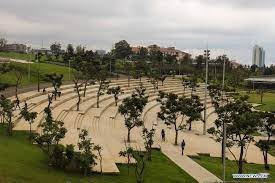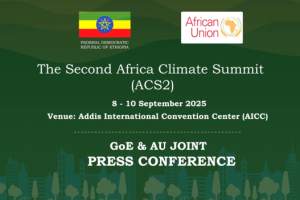
States in the world do their utmost effort to exploit the smokeless industry tourism by their historical, cultural heritage, archaeological sites, and so on. Ethiopia, as part and parcel of the globe, has exerted maximum efforts to benefit from the sector.
Many people including history depict Ethiopia and Ethiopians as polite, considerate, deliberately empathic, apologetic, affectionately smiling, minding their manners, beautiful, and emotionally intelligent to bring multiple perspectives together.
Their hospitality and moral value are immeasurable which is imperative for the tourism sector. Besides, Ethiopia’s great potential for tourism development is mentioned everywhere since the country has all types of primary tourist products: historical attractions, national parks with endemic wildlife, and cultural and religious festivals.
The United Nations Educational, Scientific and Cultural Organization (UNESCO) recognizes some of the world heritage sites: Axum’s obelisks, the monolithic churches of Lalibela, Gondar’s castles, the Omo Valley, Hadar (where the skeleton of Lucy was discovered), Tia’s carved standing stones, the Semien National Park, the walled city of Harar and so on. Ethiopia is not the only owner of world heritage sites but also it is a symbol of tolerance and peaceful coexistence among different religions and cultures.
The country has huge potential in the conference tourism area. Especially, the capital city of Addis Ababa remains the economic, political, and administrative hub of Ethiopia.
The city, in the last 50 years, has gained international significance as the headquarter of the African Union (AU), UN Economic Commission for Africa (UN-ECA), and a regional office for several international organizations including UNDP, UNESCO, and the European Economic Commission (EEC). There are also hotels which are comfortable for conference tourism.
The city is indeed known for the amalgamation of diverse cultures, relative economic prosperity, innovations of science and technology, remodeling of communities, and interactions between urban and rural areas. It is also unique from other cities in the country since it displays urban civilization, exchanges experiences, and views of urban development, and explores new approaches to human habitat, lifestyle, and working conditions in the country for more than a century. However, like many cities in the developing world, Addis Ababa is facing several challenges: population growth, lack of ample economic opportunities inadequate infrastructure, shortage of housing, and large areas of informal development with major environmental problems.
This profile identifies some of the strategic planning elements that the city could adopt as Addis Ababa strives to develop into a premier metropolitan area for a sustainable community and a diplomatic capital.
Taking the tourism potential and the challenges of the country into consideration, the government, following the political reform of the county in mid2018, has started constructing various projects. These projects are essential to improve the resident life and tourist attraction destinations.
These and other government activities raise the profile of Addis Ababa which could be taken as a crucial move to make the Addis Ababa conference a tourism city. Conference tourism is one of the fastestgrowing sections of the tourism industry in the world.
Ethiopia’s position as a regional air transport hub and as a center for regional development and diplomatic institutions offers unique opportunities to capitalize on the conference tourism sector. Ethiopian Prime Minister Abiy Ahmed said that Ethiopia is creating favorable conditions for the tourism sector by constructing various tourism destination areas.
Especially, “our claim that we will make Addis Ababa a new flower is not a myth, translated into action.” Hence, Addis Ababa is beautified as its name indicated.
Others tourist destination areas have been also under construction across the country to attract and exploit the tourist sector with the active participation and financial contribution of the people, he explained. According to Addis Ababa city administration Mayor Adanech Abiebie, the big parks were built on the premise that Addis Ababa should be as “beautiful” as its name.
These parks are built to boost the flow of tourists thereby transforming the overall socio-economy of the city. We are witnessing many results. This is just the beginning and needs to be expanded since Addis Ababa deserves a lot. Of course, Ethiopia has huge tourism potential, nevertheless, the country has not exploited this potential properly and extensively.
The tourism flow of the country is highly characterized as seasonal and observed when festivals come. Hence, it is key to enhance international meetings, conventions, and exhibitions that enable Ethiopia to exploit the potential of conference tourism. President Sahil-work Zewde said that Ethiopia is endowed with various tourism potentials including natural, historical, and cultural resources, and appropriate execution of conference tourism could make it competitive and go long way off in tourism development.
Facilitating Meetings, Conferences, and Exhibitions in Ethiopia would enable the country to exploit tourism potential by hosting regional and international events.
Because tourism is among the major sectors given priority by the government’s 10-year prospective development, she added. Therefore, it is imperative to create nexus among pertinent stakeholders to add innovative and inclusive approaches to effectively promote the true images of the country to exploit the benefits from the tourism sector.
The country should use its untapped potential of tourism through the promotion of Meetings, Incentives, Conferences, and Exhibitions (MICE). MICE could serve as the backbone to exploit the tourism potentials of Ethiopia where its capital city Addis Ababa is a seat for regional and international entities and occasionally over floods with meetings, she added. Various tasks are required to motivate the tourism sector which is highly affected by the pandemic. It is also key work to avoid safety and security challenges, the negative perception of Ethiopian-political instability, and so on.
Tourism State Minister Sileshi Girma told local media that Ethiopia is revamping its conference tourism subsector to effectively bid for holding more international conferences.
The government wants to make the country among the leading conference destinations in the world. To realize the vision, the ministry has established a convention bureau for the promotion of Meetings, Incentives, Conferences, and Exhibitions (MICE) that mainly works on conference tourism and exhibition.
MICE tourism, which represents Meetings, Incentives, Conferences, and Exhibitions, is increasingly recognized as a lucrative tourism sector across the world. In this regard, Ethiopia is wellpositioned as the country has already been hosting several international meetings, including recent AU meetings.
Furthermore, in a bid to attain its goal of making Ethiopia among the leading tourist destinations in Africa, the government has decided to diversify the tourism market, including conferences and sports tourism.
The country’s tourism resources span from cultural to historical, educational to nature and wildlife, which coupled with the maximum number of heritage sites inscribed by UNESCO, will offer a great opportunity for the sector to grow, he added. As stated by the Ministry of Tourism, the Ministry is working on expanding hotels and museums to create an opportunity for different cities outside Addis to host conference tourism.
Collaborating with concerned bodies, the ministry has supervised hotels to ensure the existence of suitable conference facilities. To this end, the Ministry has been implementing a standard that requires hotels to fulfill the art hotel facilities such as restaurants, bars, security, parking lots, and so on.
Sileshi in his part also explained that the improved visa regime, including the launch of an online visa and visa on arrival as well as the grand improvement on the airport expansion, will enable tourists to enjoy the country.
Additionally, Ethiopia is the latest destination to be awarded the World Travel and Tourism Council (WTTC) Safe Travels Stamp, which is the world’s first-ever global safety and hygiene stamp to ensure safety for residents, travelers, workers, and businesses in the tourism value chain, as Ethiopia reopened its borders to international visitors.
In general, Ethiopia has various tourism potentials that include natural, historical, and cultural resources.
Nevertheless, the country has not properly exploited the tourism sectors extensively. Hence, it is appropriate to execute conference tourism to benefits from the tourism sector.
BY EPHREM ANDARAGCHEW
The Ethiopian Herald 1 March 2022




